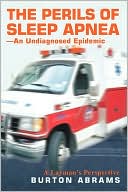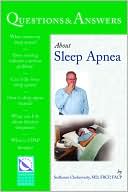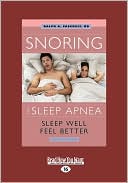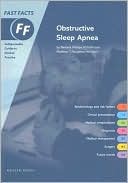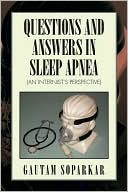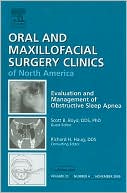Congestion can be caused by many different things. One way is through a mouth leak. As air blows out of your mouth, it dries your mouth out. In other words, this is dehydrating you. The body's natural reaction to this is congestion. So, what do you do?
What I do in the sleep lab setting is to increase the humidity and control the mouth leak. Humidity can be increased by going to a higher number on your heated humidifier. I usually start at a setting of 1 or 2. If somebody complains of congestion, I will increase it to 3 or 4. Sometimes I use 5 but only for a short time. To control the mouth leak, I usually add a chin strap. Sometimes I switch to a full face mask, but rarely.
At home, you probably don't have the liberty of going to the supply room and picking out different masks and chin straps. You probably don't even feel like getting up. No worries however, all is not lost! A simple trick is to put a pillow under your chin to keep your mouth closed. Luckily at home you CAN adjust your humidity setting too. If you are not sure how to, it is probably in the owners manual or look on your machine for a setting that goes from zero (0) to five (5). Zero is no heated humidity, but you will still be getting humidity as long as you have water in the reservoir. Setting 5 is the maximum heated humidity setting. It is okay to experiment with the humidity. At home, sometimes I need it high if I'm feeling congested or sometimes I need it low for when I don't want to breathe warm air. Experiment and you will find what you like!
Thursday, May 27, 2010
A thought from literature
But the tigers come at night,
With their voices soft as thunder,
As they tear your hope apart,
As they turn your dream to shame.
-From Les Miserables
Some consider this a metaphor for sleep apnea. It really does turn one's life upside down.
With their voices soft as thunder,
As they tear your hope apart,
As they turn your dream to shame.
-From Les Miserables
Some consider this a metaphor for sleep apnea. It really does turn one's life upside down.
Tuesday, May 25, 2010
Mouth Breathing Myth
When my patients return for their titration sleep study, I mainly use nasal masks. Many patients explain to me, "but I breathe through my mouth when I sleep." Don't let the title of the blog fool you. These people are right! I even witnessed it during their first night. Why do I say "Mouth Breathing Myth" then? First, a short explanation.
People with sleep apnea have a "clogged" airway, to put it simply. Imagine if somebody pinched your nose closed. You won't suffocate because you know you can breathe through your mouth! So, when your nasal airway closes off, your mouth will open to get the breath that you need. This makes one a mouth breather.
Hence with Positive Airway Support (xPAP), you will be getting the air you need through your nose to open the airway and give you the air you need. This is the purpose of the titration night, to find the pressure that breaks through your clog. It is a natural tendency to breathe through your nose. Once you are able to breathe freely through your nose, your body will revert back to that tendency instead of being in survival breathing mode.
Some patients have a strong habit of breathing through their mouth even though I have them fixed on xPAP. With these people, I add a chin strap. The chin strap usually works well. The mouth breathing habit usually subsides after a short time.
There are some true mouth breathers out there however. These are people who have a deviated septum (severe) or someone who has had their nose broken several times or maybe just once, but severely. It is for these individuals that I break out the full face masks. I usually only have to do this 2 or 3 times a year.
My point being...give the nasal masks a good try before you go to full face. Nasal masks are much more comfortable, they give you more mobility in sleeping positions, and they keep a better seal. It has been shown compliance is low when somebody uses a full face mask vs. a nasal mask.
People with sleep apnea have a "clogged" airway, to put it simply. Imagine if somebody pinched your nose closed. You won't suffocate because you know you can breathe through your mouth! So, when your nasal airway closes off, your mouth will open to get the breath that you need. This makes one a mouth breather.
Hence with Positive Airway Support (xPAP), you will be getting the air you need through your nose to open the airway and give you the air you need. This is the purpose of the titration night, to find the pressure that breaks through your clog. It is a natural tendency to breathe through your nose. Once you are able to breathe freely through your nose, your body will revert back to that tendency instead of being in survival breathing mode.
Some patients have a strong habit of breathing through their mouth even though I have them fixed on xPAP. With these people, I add a chin strap. The chin strap usually works well. The mouth breathing habit usually subsides after a short time.
There are some true mouth breathers out there however. These are people who have a deviated septum (severe) or someone who has had their nose broken several times or maybe just once, but severely. It is for these individuals that I break out the full face masks. I usually only have to do this 2 or 3 times a year.
My point being...give the nasal masks a good try before you go to full face. Nasal masks are much more comfortable, they give you more mobility in sleeping positions, and they keep a better seal. It has been shown compliance is low when somebody uses a full face mask vs. a nasal mask.
Monday, May 24, 2010
CPAP Forever?
I actually hear this question a lot. Before I address the question directly, let me make one point. When it comes to a person wearing glasses or corrective lenses or contacts... who really wants something on your face or in your eyes? I don't think anybody does. But, people tolerate glasses and contacts because it makes the quality of life much better. The quality I speak of is vision of course. So, with CPAP, I tolerate it because it makes my sleep better which in turn makes me happier in many ways. So, once you get glasses, you probably need them for the rest of your life. Now, back to the original question.
Will I have to wear CPAP forever? The answer is...it depends. There are three general categories people fall into that use CPAP: airway architecture, large tonsils, and obesity.
Some people need CPAP because the architecture of their airway is constricted. This can be genetic in that is how you are "designed" or the genetic material inherited from your parents determined your airway size. A simpler way to look at it is some people are tall. Some people have small hands. Some people have bigger airways and some people have smaller airways. If somebody falls into this category, most likely you should use CPAP for the rest of your life.
Another category for constricted airways is large tonsils. Most likely this category of CPAP user will have to use CPAP for the rest of his or her life unless you have surgery to remove your tonsils. Removal of the tonsils is not a guarantee to get off of CPAP.
The last category of CPAP users is obesity. Most people on CPAP fall into this category. When a person gains weight, his neck becomes thicker or weight is gained beneath the chin. Weight is gained in other areas of the body too of course. But, when the neck and face become thicker, that adds to the constriction of the airway causing sleep apnea in some people. What actually is happening is more complicated than this but for our purposes I'll leave it at that. So, people gain weight and people lose weight. When you lose weight, some of that weight is taken off of your airway. So, theoretically, you can lose enough weight to get off of CPAP. I have been doing sleep studies on people for 10 years now and I've only seen 1 person able to do this. But don't let that burst your bubble. There is probably others that have done it, they either just don't come back to get re-tested or go to another sleep lab...or the possibilities go on.
In general, once you are on CPAP, most likely you will need it indefinitely. But, don't let that deter you from trying to lose weight or maybe even getting surgery. When it comes to surgery, there are some caviots which I may touch on later if there is interest. I hope this helps!
Will I have to wear CPAP forever? The answer is...it depends. There are three general categories people fall into that use CPAP: airway architecture, large tonsils, and obesity.
Some people need CPAP because the architecture of their airway is constricted. This can be genetic in that is how you are "designed" or the genetic material inherited from your parents determined your airway size. A simpler way to look at it is some people are tall. Some people have small hands. Some people have bigger airways and some people have smaller airways. If somebody falls into this category, most likely you should use CPAP for the rest of your life.
Another category for constricted airways is large tonsils. Most likely this category of CPAP user will have to use CPAP for the rest of his or her life unless you have surgery to remove your tonsils. Removal of the tonsils is not a guarantee to get off of CPAP.
The last category of CPAP users is obesity. Most people on CPAP fall into this category. When a person gains weight, his neck becomes thicker or weight is gained beneath the chin. Weight is gained in other areas of the body too of course. But, when the neck and face become thicker, that adds to the constriction of the airway causing sleep apnea in some people. What actually is happening is more complicated than this but for our purposes I'll leave it at that. So, people gain weight and people lose weight. When you lose weight, some of that weight is taken off of your airway. So, theoretically, you can lose enough weight to get off of CPAP. I have been doing sleep studies on people for 10 years now and I've only seen 1 person able to do this. But don't let that burst your bubble. There is probably others that have done it, they either just don't come back to get re-tested or go to another sleep lab...or the possibilities go on.
In general, once you are on CPAP, most likely you will need it indefinitely. But, don't let that deter you from trying to lose weight or maybe even getting surgery. When it comes to surgery, there are some caviots which I may touch on later if there is interest. I hope this helps!
Thursday, May 20, 2010
Tip of the night.
When wearing your mask, be sure it fits comfortably. Make sure it is not too tight or too loose. How do you know? Experiment! You may have to do this in front of a mirror or with a helper. First, go ahead and start your machine and put your mask on. Next, adjust the straps in different ways, either tightening or loosening in order to get different feels of fit. This is the part where you may need a helper or the mirror. If you find a position that feels more comfortable, then lay down with it to ensure that you maintain your seal, that is, no leaks. If it leaks, continue to adjust and experiment with the straps or holding mechanism until you feel a more comfortable fit. Good luck with your mask and happy sleeping!
Introduction
I have been in the sleep business for 10 years now performing sleep studies and applying CPAP and BiPAP in different ways. I've used most masks on the market either on myself or on patients. I also rely on CPAP myself to help me with my sleep apnea. My intention with this blog is to post tips and hints for a positive experience either with a sleep study or with CPAP and BiPAP itself. I look forward to blogging and hearing feedback.
Subscribe to:
Comments (Atom)
